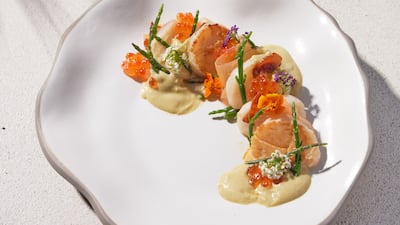It's a hot summer day in Dubai's busy financial district, but the weather is a fitting context for a conversation with the owner of Boca, a Spanish-inspired Michelin Green star restaurant.
“Because we're a home-grown brand, we wanted to dedicate parts of our menu to local ingredients,” says Omar Shihab. proudly.
Local sourcing has become somethings of a buzzword in the country's flourishing restaurant industry and technology-enabled farms have made more crops accessible, but Shihab and his team are taking things to the next level.
“What is really native to the UAE? Can we really represent something from the land? These were the questions we started asking ourselves,” says Shibab. The short answer, the restaurateur adds, is a resounding yes. Fortunately for him, a research centre in Dubai has been asking the same questions for years.
Scientists at the International Center for Biosaline Agriculture, or ICBA, have been studying climate-resilient crops that grow in the UAE's high heat, salty waters and poor soil conditions. As part of a wider environmental project, the centre has rated the potential of some of these plants as a major fixture in mainstream dining.

Enter Shihab and his team at Boca. Along with chefs Luca Cobre of Health Farms Eatery and Kelvin Cheung of Jun's, they hosted cooking demonstrations at the Umm Al Quwain Mangrove Reserve in May that featured freshly harvested halophytes salicornia and arthrocaulon.
These crops have adapted to thrive in environments with high concentrations of salt. ICBA, along with project partner Emirates Nature-WWF, believes that the salt-loving greens have the potential to be unconventional ingredients in gourmet dining and could also be transformed into other by-products.
Shihab, Cobre and Cheung are already experimenting in their respective kitchens. “You have to treat it with a little bit of care because it is so punchy and strong and the flavour can almost be overwhelming if you don't use it properly,” Cheung tells The National. “We're conducting tests and research because we want to figure out how we can make these plants something that the mass market will understand and appreciate.”
At Jun's, Cheung incorporates salicornia into a few dishes, such as the brown butter paprika prawns and scallops with matcha cream.
Both Cheung and Shihab agree that reaching critical mass for the appreciation of these ingredients is crucial, especially with crops not being commercially farmed yet.
“I believe chefs have transformative powers,” says Shihab. “This is why we've collaborated with ICBA and Emirates Nature-WWF to explore how we can extend the utilisation of these crops in our kitchen.”
Power of chefs
Salicornia and arthocaulon are currently being cultivated at a pilot farm in Umm Al Quwain. The goal, says Shihab, is to build awareness around the potential of halophytes and eventually spark local farming communities to cultivate in larger quantities.
“Chefs know about these ingredients, but we need to get a lot more excited about them,” he says. “Chefs have all the tools, techniques and knowledge: they are able to take one ingredient and transform it to many things. Can we dehydrate these plants? Can we pickle, marinade, fry or roast them? Can we make a pesto of them, or a sauce?”

“The application options are enormous. We just need to get more excited and work harder. These are not the easiest ingredients to work with.”
Shihab believes Dubai is home to many creative chefs who “are influential people” and when they say something, “the world listens”.
The project is in its “very early stages and it's all about experimenting and building momentum,” admits Shihab, who reveals that more chefs have expressed an interest taking part in the project. “We hopefully want to build this momentum so that farmers realise it can be lucrative for them too,” he says.
Cheung echoes Shihab's sentiments, describing halophytes as a relatively “unknown product” without a sustainable demand.
“If chefs band together and commit to using these products, farmers would feel more inclined to raise them,” he explains. “Remember, it's a huge investment of them as well.”
Eventually Cheung says the vision is to push these halophytes out to supermarket shelves, and people “understand that this is something they can cook at home and incorporate in their everyday meals”.
Next steps
Aside from their culinary potential, halophytes are known to have environmental benefits and Shihab wants to emphasise these as he grows awareness.
“We want to build momentum in the wider industry and say that cultivating halophytes has so many benefits for all of us, even from an environmental perspective such as decreasing salinity, sequestering carbon and helping to boost biodiversity,” he explains.

“We want to talk to food manufacturers too, and see what they can do with these plants. We want to speak to more chefs, farmers and other people in the business.”
Shihab and other entities involved in the project are attending Gulf Food Green in September to further champion their cause. “We've got a couple of sessions on panels and keynote speeches in a few conferences from now until the end of the year,” he says.
They are also planning to host a harvest festival in Umm Al Quwain and invite the public to tour the pilot farm. He is aiming to raise awareness among people outside of the food industry. “We need investors and we need people who can see the potential,” Shihab adds.
In October, a printed guide featuring a detailed explanation of halophytes in the UAE will be published. It will also contain recipes that include the crops.
Shibab says: “There are a lot of us now calling the UAE home and unearthing and utilising what grows in the desert.”

